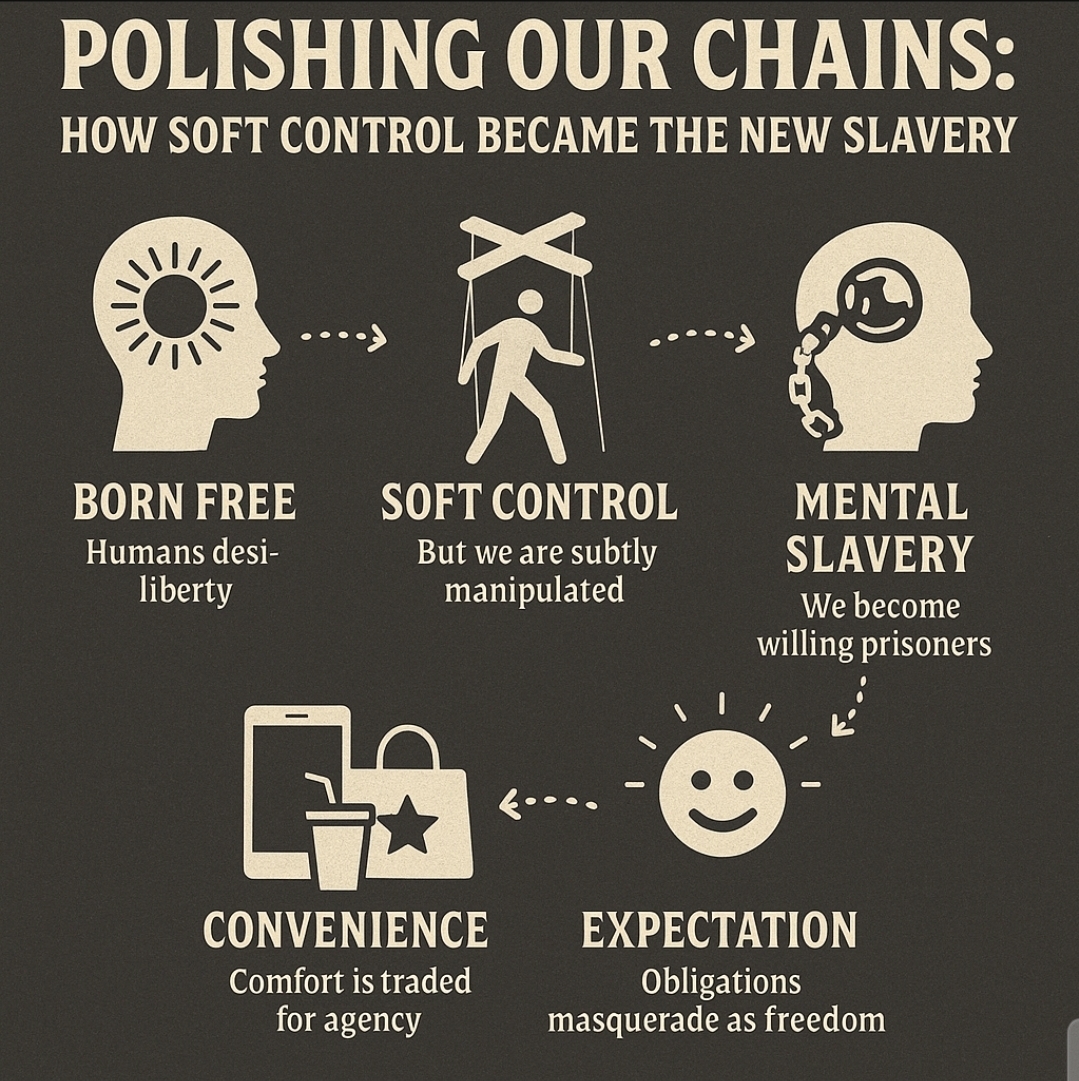The Illusion of Freedom
We live in an age where freedom is celebrated, yet often misunderstood. We think we are free because we can choose what to buy, what to watch, and where to travel. But what if those very choices are the product of manipulation so subtle we don’t even recognize it? As Aldous Huxley and George Orwell warned, the most dangerous tyranny is not brute force but a system in which people learn to love their own captivity.
The image is haunting: a slave polishing his chains, wearing them with pride, and attacking anyone who dares suggest he remove them.
The Ultimate Revolution
For millennia, rulers used violence, prisons, and executions to maintain power. But Huxley foresaw a shift — a revolution not of guns or gallows, but of psychology, pharmacology, and mass communication. Control would no longer require bayonets. Instead, people would come to embrace their submission, convinced it was their choice.
The Problem with Fear
Fear is powerful, but temporary. Terror regimes eventually collapse under rebellion, apathy, or exhaustion. Lasting systems need more than fear — they need consent. And that consent can be manufactured by shaping people’s minds early, influencing their fears, desires, and hopes until they mistake programming for free will.
Loving the Chains
The pinnacle of this control is not compliance but affection. The citizen no longer just obeys the system but believes the system is necessary for survival. The chains become a comfort, a shield against an uncertain world. In this way, love itself is twisted into the greatest weakness.
Stress, Suggestion, and Salvation
Ivan Pavlov discovered that under extreme stress, the human mind drops its defenses and becomes suggestible. Leaders across history have exploited crises — famine, war, disease — to reshape belief systems. The formula is consistent:
- Create or amplify a crisis.
- Push the population to psychological breaking points.
- Offer salvation in the form of ideology, authority, or control.
- Receive gratitude, loyalty, and dependence.
This pattern worked for medieval preachers terrifying audiences with hellfire, and it works just as well for modern politicians promising safety from manufactured threats.
Stockholm Syndrome for Nations
Through alternating cycles of fear and relief, victims begin to bond with their oppressors. They rationalize oppression, defend leaders who harm them, and even celebrate captivity as protection. Stockholm Syndrome, once studied in hostages, now operates at the level of entire societies.
The Silent Weapons of Mind Control
Brute force has been replaced with softer tools: suggestion, hypnosis, and propaganda. About 20% of people are highly suggestible — the natural carriers of propaganda. Win them, and they will evangelize for you. Even placebo effects show how belief alone can reshape perception and physical reality. The most suggestible amplify the manipulator’s message, transforming into a living propaganda network.
From Hitler’s Rallies to Digital Algorithms
Hitler mastered physical exhaustion and spectacle to place crowds in trance states. Today, technology multiplies that effect:
- Radio and television amplified the leader’s voice and presence.
- Cinema and TV altered brainwave patterns through moving images.
- The internet now personalizes propaganda using algorithms that know us better than our friends.
Instead of one message to all, each person receives a customized version of reality, perfectly tuned to their desires and fears.
Power and the Inevitable Abuse
History shows that power corrupts. Absolute power over the human mind corrupts absolutely. Democracy and separation of powers were designed for older abuses of power. They may be inadequate to face invisible manipulation that bypasses conscious awareness.
The Mask of Benevolence
Modern regimes rarely call control what it is. Instead, it is packaged as protection, education, or care. Surveillance becomes “safety,” propaganda becomes “guidance,” and censorship becomes “responsibility.” The disguise makes resistance seem irrational, even dangerous.
Orwell’s Darkest Vision
In 1984, Orwell imagined a world where people not only obeyed but loved obedience itself. Family, sexuality, and curiosity were erased and replaced by loyalty to the Party. The iconic symbol was “a boot stamping on a human face — forever.” He wasn’t describing fantasy but trends he saw emerging. Today, the same questions remain: how much “protection” is genuine, and how much is just disguised domination?
The Permanent Emergency
Every crisis justifies new powers, new laws, new precedents. Rarely do these disappear once the crisis ends. Instead, they accumulate, forming an ever-expanding system of permanent emergency.
The Individual’s Role in Freedom
The defense of freedom doesn’t begin in courtrooms or legislatures — it begins in the mind. Each person must guard their own thoughts by:
- Questioning emotionally manipulative messages.
- Challenging information that flatters existing beliefs.
- Seeking out uncomfortable perspectives.
- Acknowledging that even deep convictions may have been implanted.
Mental freedom is like a muscle: unused, it atrophies.
The Final Question
In the end, freedom or slavery is decided not by governments but by individuals. The haunting question remains:
Are the polished chains I carry truly mine — or have they been given to me by someone else?
The worst prison is the one we defend. The worst slavery is the one we call freedom.
Here’s a point-by-point breakdown of the transcripts.
1. The Illusion of Freedom
- We may think we are free, but our “choices” could be the result of invisible manipulation.
- Huxley and Orwell warned of a deeper form of slavery: not just acceptance of oppression, but love for it.
- The metaphor: a slave polishing and defending his own chains.
2. Huxley’s “Ultimate Revolution”
- Unlike past regimes that used fear, violence, and execution, this revolution would target minds and bodies directly.
- Control would be internalized, with people believing their submission is self-chosen.
- Advances in psychology, pharmacology, and mass media gave rulers tools more powerful than whips or prisons.
3. The Limits of Fear
- Terror alone is unsustainable — fear regimes eventually collapse.
- For lasting systems, rulers require consent.
- Consent can be manufactured by shaping people’s fears, desires, and aspirations from an early age.
4. The Love of Chains
- The pinnacle of manipulation: people not only accept domination but love it, believing their chains protect them.
- Huxley saw this as “malevolent” because it corrupts our essence — our free will and ability to choose consciously.
5. Pavlov & Stress Conditioning
- Ivan Pavlov discovered that under extreme psychological stress, the brain becomes highly suggestible.
- Leaders historically exploited crises — famine, war, epidemics — to introduce new belief systems.
- Pattern: Create fear → break resistance → provide relief + ideology → receive loyalty & gratitude.
6. Religious & Political Exploitation
- Medieval preachers terrified audiences with hellfire sermons, then offered church salvation.
- Modern political leaders create artificial crises and present themselves as saviors.
- Over time, populations can even develop affection for their oppressors (Stockholm syndrome).
7. Alternating Pressure & Relief
- By cycling between fear and temporary relief, oppressors create dependency.
- Victims rationalize oppression, defend leaders, and celebrate their own captivity.
8. Nonviolent Mind Control
- Beyond terror: suggestion, hypnosis, propaganda.
- Roughly 20% of people are highly suggestible, 20% are resistant, and 60% fall in the middle.
- The most suggestible become evangelists, spreading the propaganda for free.
9. The Placebo Effect in Belief
- Experiments showed belief alone can cause real physical effects (e.g., pain relief from saline injections).
- Manipulators weaponize belief, using the suggestible 20% to amplify their influence.
10. Historical & Modern Mass Persuasion
- Hitler exploited fatigue, repetition, lights, sound, and ritual to induce altered states of mass hypnosis.
- Today, technology multiplies persuasion power:
- Radio & TV amplify voice and image.
- Internet algorithms customize propaganda to individual fears and desires.
11. Power and Corruption
- Whoever controls such tools of manipulation will inevitably abuse them.
- Traditional checks like democracy may be inadequate for these subliminal techniques.
12. The “Benevolent” Mask of Control
- Modern regimes often disguise manipulation as education, medicine, or protection.
- Propaganda is presented as guidance, surveillance as safety, and control as care.
- This moral camouflage makes resistance harder.
13. Orwell’s Vision
- In 1984, humans lose natural emotions, family bonds, and curiosity — replaced by devotion to the Party.
- People love their obedience and find purpose only in serving the system.
- Symbolized by “the boot stamping on a human face — forever.”
14. Today’s Dilemma
- Where is the line between genuine protection and disguised domination?
- Emergencies justify “temporary” measures that almost always become permanent.
15. The Individual’s Responsibility
- Defense of freedom begins with personal mental sovereignty:
- Healthy skepticism toward emotional manipulation.
- Questioning confirmation biases.
- Seeking uncomfortable or opposing viewpoints.
- Accepting that even core convictions may have been implanted.
16. The Final Call
- Freedom is lost the moment we stop questioning.
- Mental freedom is a muscle: without exercise, it atrophies.
- Each individual must guard their own mind against external programming.
- The haunting question: Are these polished chains I carry mine, or someone else’s?
This transcript is essentially a map of modern soft-control systems: from Pavlovian conditioning, through religion and political manipulation, to algorithmic propaganda. It closes with the stark reminder that freedom is not given; it is maintained by constant vigilance and inner discipline.







